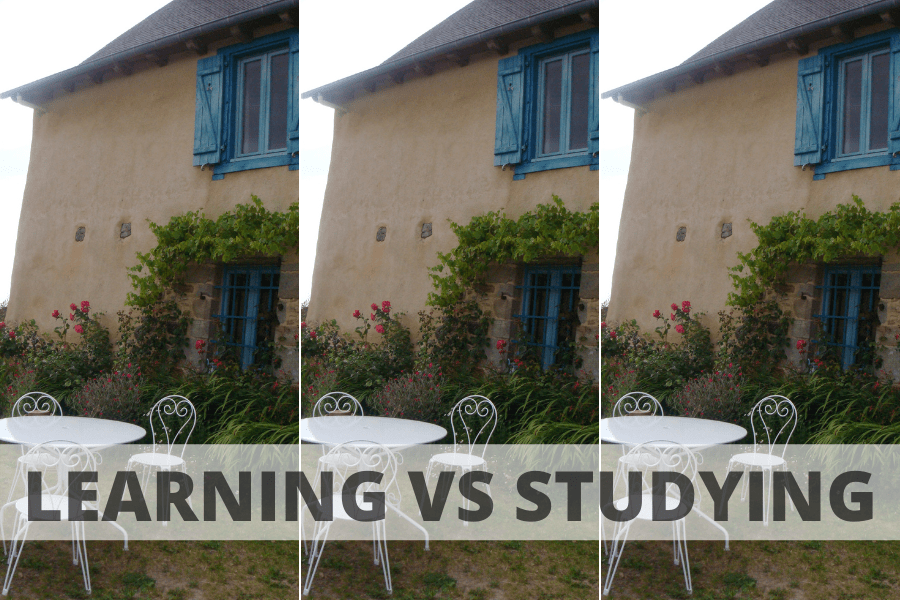LEARNING VS STUDYING – 1 AMAZING CONCEPT EVERYONE WHO IS INTERESTED IN LEARNING SHOULD KNOW
This post is all about Learning vs studying
To study or to learn? That is the question that every student and teacher should try to answer.
You are going to find out that by opening the case learning vs studying, we can make an open argument that will not leave the judge indifferent. I was not indifferent to this discovery and you will not be indifferent to it either.
I hope that after reading these lines you will use these arguments to make your own final argument and change your learner’s life for the better. Here is the trial of Learning vs studying.
This post is all about Learning vs studying that every student and teacher should read
LEARNING vs STUDYING
Definition of Studying
The Cambridge dictionary gives a definition of the word ‘study’ as the act of learning. But isn’t this definition misleading? As I see it, this definition is just a promise that if you study, you will automatically learn. Is that the case?
In reality, after hundreds of education reforms since the school system was created a few centuries ago, at least in our occidental world, we have only managed to give birth to an embryo of good solutions for preschool and elementary school, with Montessori for example.
So, yes, we can study and not learn. That is a fact. All these reforms just prove my case. Why would we reform a system where the children learn efficiently? As the children continue to miss the goal we are setting up for them to reach, we continue to come up with reforms.
An easy solution
To find a solution to the problem of learning vs education, we could look at it from a different angle. What if, instead of saying that learning is the natural consequence of studying, we could admit that this assumption is not true and that it would not be a bad idea to force both concepts to compete with each other.
Let’s recognize the fact that there are different ways we can learn and that studying is only one of them. Studying is the one used at school and we keep trying to improve it without satisfaction. Can we then eliminate the idea of studying altogether and build another system for middle school and high school?
What about changing it to emphasize learning instead?
Some like to study
About 10% of our students, that means 2 or 3 per class, really like to study. Let’s call them nerds mostly. I don’t even say ‘like’ school. You might like school to mingle with your friends and still not care much about studying.
The same number will not like to study. To make it simple, we traditionally label them as dunces. All the rest are indifferent to study.
So a student studies. That’s what you do at school. It’s written in your name, your DNA. To say that you learn is an exaggeration. You are not there to learn. However, if only a few enjoy school, we can assume that every child likes to learn.
A student studies but who learns?
If you have followed me through this blog, you know that an apprentice learns. Why?
What does ‘learn’ really mean? The translation of ‘to learn’ in French is ‘apprendre’. In Spanish and Portuguese, it’s ‘apprender’. Both verbs start with the six letters that also start the English word ‘apprentice’. That is to prove to you that an apprentice learns. It’s his job. It’s written in its name.
There are students who don’t learn but there is no apprentice who doesn’t learn. They would be fired and do something else.
Talking about French.
You know, I am not an expert in the French language. I would not know how to talk about it, or to write about it. But did I master it? You bet I did. I am speaking French pretty well. At least I am fluent. I learned it and I mastered it. Did I study French? yes. But only after I mastered it.
What I can talk about is learning French. Am I an expert? Time will tell. But at least, I mastered the language before I started to talk about learning it.
I BELIEVE THAT IN ORDER TO LEARN BETTER, COMFORT AND SELF-CONFIDENCE ARE ESSENTIAL, THAT IS WHY IN ALL MY COURSES I SHOW YOU THESE LETTERS THAT BOTHER YOU FROM BEING THERE WHILE THEY ARE NOT PRONOUNCED. THAT IS ALSO WHY I SIMPLY ASK YOU TO IMITATE ME OVER AND OVER USING A LANGUAGE THAT IS CONTRACTED SO THAT YOU WILL FEEL EMPOWERED WHEN THE TIME COMES FOR YOU TO COMMUNICATE WITH THE FRENCH.
While it is possible to learn through studying, not all manage to do that. And it can be painful. So the question is:
How do we learn if it’s not through studying?
In the series ‘the Crown’, Charles’ Welsh teacher tells him that: “we learn through imitation. Like anything in life, if we pretend to be something long enough, we may become it’.
I don’t know if it was the teacher’s original quote or the Crown’s writer’s, but it’s that belief that has motivated me for 20 years to develop my language method. If you are interested, please find the info:
HERE
If the Crown’s writers are correct for the learning of languages, then everything could and should be learned through imitation. Is it better to learn through imitation than through studying? I don’t know, but if reforms haven’t made studying more efficient, then at least we can try other means, like learning through imitation.
For the Academics
If there is another way to learn academics than to study them, and the study doesn’t work, why don’t we try imitating? Because I know it’s possible.
A lot has been written about the curriculum and the need to change it. Changes have been made but not the result. When a big number of books and articles have been written on ‘learning’, few and maybe none of them address the form in which the knowledge is transferred. They generally question the content. My system takes the form into account.
To learn is what the apprentice does when he or she imitates the master. There is no shame in doing that. All the great masters have all started by imitating other masters. They were even called: ‘schools’. The schools of painting, etc…
What becomes of the child?
While an apprentice becomes a master, A student, on the other hand, will become an expert.
When school was invented, it seems that a crucial step was overlooked. Instead of showing as a master does, the teachers started to lecture. It’s still the case today. It might be time to reconsider the situation. In my opinion, we have constantly focused on improving the content (organization, curriculum, schedule, technology). We didn’t address the form. That was my concern since I started to look into it.
An expert will rarely become a master. On the other hand, a master could really well become an expert.
Advantages of learning vs studying
Mastering academics faster
We cannot deny the fact that the acquisition of academics is a necessity. And for that, time is needed. The fastest way to get a result that would satisfy the authorities in terms of education is to imitate rather than to study. Actually, we learn directly when we use imitation.
Reducing inequalities at school
As everyone likes to learn, even the traditionally challenged and disadvantaged student, now an apprentice, would be able to go through unscathed. In my opinion, the value of the group would level up.
Emphasizing teamwork, like in sports
I am sure that if we address issues from a different angle, if we think out of the box, solutions start to surface and we can all create a new normal. Then we can choose which solution will reduce inequality and favor equally the nerd and the challenged child. That way, they would be more inclined to work together for the good of all.
References
2 generations ago, in elementary school, the pupils had a master or a mistress, someone who could show what and how to do, someone we only had to imitate, to copy. We changed it to ‘teacher’.
The definition of a teacher is the person who teaches. I looked at the definition of to teach: I found: to show or explain something to someone. That is a big surprise because in general, there is more explaining than showing. The word ‘teaching’ is lacking a strict meaning. We can’t grab its meaning. Therefore the confusion.
Le Petit Robert
The well-known French dictionary says of the teacher, that he or she is the person who teaches (enseigne) a subject, an art, a technique, in a usual manner.
I looked at the definition of ‘enseigner’, to teach: transmit knowledge or techniques to a child in order for him to understand and assimilate.
A second definition says that to teach is: Apprendre a quelqu’un. To learn “to” someone. Yes in French, we can use ‘to learn’ both ways, from both perspectives, the person who receives and the person who gives. It also says that it’s: to teach someone, through a lesson or through example, meaning show.
These are broad definitions that don’t take into account the difference between learning and studying, mixing them all together.
The result of a broad definition
The choice of words is so important that we can demand a more precise definition of what we are doing so that we can be more efficient. Consequently, if what we are doing in school is clear, we can be given the tools to show as much as to lecture the kids. But again, if I don’t separate the two activities, one will take the lead and the other one will be forgotten. Then we will study and we will forget to learn.
If you want to LEARN French, check my course info HERE
To finish today
A student studies and becomes an expert, and an apprentice learns and becomes a master.
An expert talks very well about things he doesn’t do.
A master does very well things he doesn’t care to talk about.
A master can very well become an expert and talk about things he’s done.
An expert will rarely become a master. Food critics are not necessarily good cooks.
Let’s follow the children. They want to learn
This session was all about learning vs studying or learning vs study exercises
Other Posts You May Like





